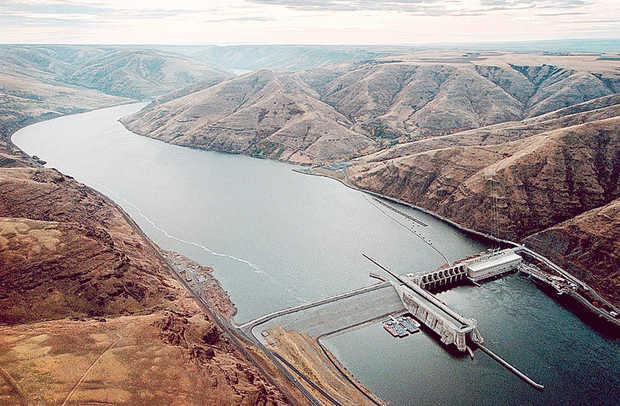forum
library
tutorial
contact

To Aid the Killer Whales, the Real
Apex Predator gets Some Pushback
by Danny Westneat
Seattle Times, May 10, 2023
|
the film forum library tutorial contact |

|
To Aid the Killer Whales, the Real
by Danny Westneat
|
"In the great debate to save the orcas, the apex predator is missing."
 The environment is usually portrayed as a story first and foremost about the world, about Earth and its health. But it's really a story about us.
The environment is usually portrayed as a story first and foremost about the world, about Earth and its health. But it's really a story about us.
Humans don't like being told "no."
This is just our nature. We are understandably stuck in our ways, or our cultural practices, or our means of making money, and so don't really want to change, even when sirens are going off around us.
Two recent environmental decisions are pushing back on all that -- to maybe jar us out of some ruts.
The first is a potentially landmark federal court ruling that, for now, would cancel a big part of this summer's West Coast commercial salmon fishing season, in Alaska. It's to help the king salmon recover, which in turn has the goal of leaving more food for endangered orcas.
The suit was brought by Duvall-based Wild Fish Conservancy -- a group I quoted in a 2019 column headlined: "In the great debate to save the orcas, the apex predator is missing."
That article argued that a big effort to save Puget Sound's killer whales had conspicuously left out the most obvious, high-impact and immediate thing we could do: We could stop fishing for a while.
"We have a patient that is starving to death, and we're ignoring the one thing that could help feed the patient right now. We're flat out choosing not to do it," said Kurt Beardslee of the environmental group, back then.
I suggested in that column that we simply stop fishing for king (Chinook) salmon for a few years. During that time, the government could instead pay the various fishing interests not to fish, kind of like how we pay farmers to let fields lie fallow.
That got me chastised as "misinformed," "knee-jerk" and other less polite appellations by various fishing outfits around here.
Four years later, the federal courts are saying it's such an emergency we ought to try this exact thing.
"The record before the Court suggests that closure of the fisheries meaningfully improves prey available to the [orcas], as well as [orca] population stability and growth, under any scenario," concluded a 40-page report that was approved last week by U.S. District Court Judge Richard Jones.
Not sure why it took 40 pages. Of course if we stop fishing it will help the fish population. Beardslee dubbed it "an absolute no-brainer," and he was right.
What the court ordered is for the federal fish agencies to go back and craft a plan that doesn't so heavily favor human concerns over whales and endangered fish. It wouldn't necessarily mean zero fishing. But it's causing an uproar. In the short run it may lead to serious pain, too, potentially shutting down hundreds of fishing boats headed to Alaska this summer.
It didn't have to be this way. We could have done a fishing shutdown in a planned fashion, with support payments ready to prop up a vital industry, like disaster relief.
But people didn't wish to even contemplate it. The government just kept approving fishing levels that it knew weren't sustainable, the court found. It was as if what was happening in the real world didn't matter.
Another recent environmental struggle followed a similar story arc. Seattle City Light, after decades of refusing to acknowledge the harm its three Skagit River hydroelectric dams had done to salmon, finally agreed to pass spawning salmon around the dams.
They had to be sued into it by the Sauk-Suiattle Tribe. As well as scolded by outside biologists during a permit process for the dams.
Seattle City Light "is using outdated, anecdotal information," argued the federal National Marine Fisheries Service. "Throughout, [Seattle City Light] provides discussions and arguments suggesting that the current license has been successful as justification for maintaining the status quo."
We've always done it like this. Proof positive to keep doing it like this.
To its credit, City Light flipped on this. That was partly because it was losing in court. Still, though, it's not easy to shift decades of inertia, to jump out of a rut.
These two cases are both biologically and politically complex. There's no guarantee that pressing the stop-fishing button will help the orcas, any more than fish passage around dams will for sure recover a depressed Skagit salmon run. There are also big economic factors. But it's the psychological resistance to seeing what's right in front of our noses -- the obvious hulking impact of the apex predator -- that I'm highlighting here.
Remember how America reacted to the pandemic: blinkered and stubborn. Then multiply that response across myriad environmental challenges, from wildlife extinctions to vast, globe-spanning problems such as climate change. We've got our work cut out.
The headline subjects of these latest cases were the endangered fish and whales, and the good news is, they won. The verdict's out on a more hardheaded and unruly species.
Related Sites:
Federal Judge Richard Jones' Order and Recommendation
learn more on topics covered in the film
see the video
read the script
learn the songs
discussion forum
